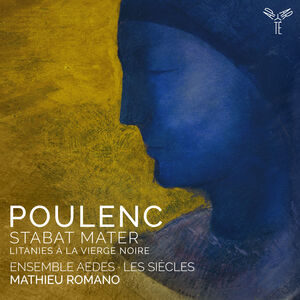Show results for
Deals
- Blu-ray Outlet
- New Release 4K
- New Release Blu-ray
- New Release DVD
- New Release Gifts
- New Release Music
- New Release Vinyl
- Top Seller 4K
- Top Seller Blu ray
- Top Seller DVD
- Top Seller Vinyl
- top sellers all movies
- top sellers all music
- Top Selling Gifts
- TV Outlet
- Top Seller Music
- DVD Outlet
- In Stock Outlet
- Music Outlet

Poulenc: Stabat Mater Litanies a la Vierge noire
- Format: CD
- Release Date: 20/10/2023

Poulenc: Stabat Mater Litanies a la Vierge noire
- Artist: Ensemble Aedes & Mathieu Romano
- Label: Aparte
- Genre: Classical
- UPC: 5051083190435
Product Notes
The ensemble Aedes began it's musical journey with Poulenc, under the impetus of conductor Mathieu Romano. Here, at the head of Les Siècles, Romano returns to the unclassifiable composer to record two of his major works. In the pious contemplation of the Litanies, here performed in the manuscript version, and the orchestral luxuriance of the Stabat Mater, spirituality is expressed through music that is lively, sensitive and even, at times, sensuous. Sculpting out every phrase and note, always at the service of the text, the ensemble and Mathieu Romano confirm their affinity with the composer's language. As an interlude Mathieu Romano has included a secular piece, O doulx regard, o parler gratieux, by the Renaissance composer Clément Janequin. The boundaries between earthly love and mystical love are thus abolished in favor of pure emotion.


